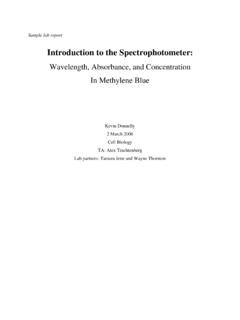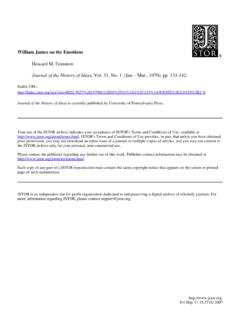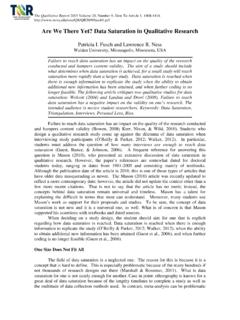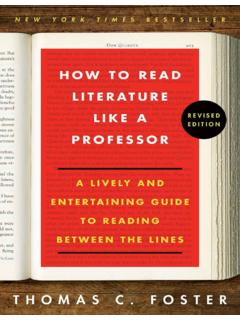Transcription of Twilight of t he Idols - umb.edu
1 FriedrichNietzscheTwilightof theIdolsTranslated byRichard PoltIntroduction byTracy Strong Twilight of the Idols Twilight -00 Book Page i Monday, August 24, 2009 4:52 PMBlack process LPI FRIEDRICH NIETZSCHET wilight of the Idols Or,How to Philosophizewith the Hammer Translated by Richard Polt Introduction by Tracy Strong Hackett Publishing Company, Inc. Indianapolis/Cambridge Twilight -00 Book Page iii Monday, August 24, 2009 4:52 PMBlack process LPI Friedrich Nietzsche: 1844 1900 Twilight of the Idolswas first published in 1997 by Hackett Publishing Company, Rights ReservedCover Design by Listenberger Design & AssociatesInterior Design by Dan KirklinPrinted in the United States of America4 5 6 7 10 09 For further information, please address Hackett Publishing Company, Inc. P. O. Box 44937 Indianapolis, Indiana 46244 of Congress Cataloging-in-Publication DataNietzsche, Friedrich Wilhelm, 1844 1900.
2 [G tzend mmerung. English] Twilight of the Idols , or, How to philosophize with the hammer/[by Friedrich Nietzsche]; translated by Richard Polt; introduction by Tracy Strong. p. cm. Includes bibliographical references and index. ISBN 0-87220-355-7 ISBN 0-87220-354-9 (pbk.) 1. Philosophy. I. 1997193 dc21 96-40331 CIPISBN-13: 978-0-87220-355-6 (cloth)ISBN-13: 978-0-87220-354-9 (pbk.)Adobe PDF ebook ISBN: 978-1-60384-880-0 v Contents Introduction by Tracy viiBibliography on xxixTranslator s Note .. xxxi Twilight of the Idols Foreword .. 3 Epigrams and Arrows .. 5 The Problem of Socrates .. 12 Reason in Philosophy .. 18 How the True World Finally Became a Fiction .. 23 Morality as Anti-Nature.
3 25 The Four Great Errors .. 30 Those Who Improve Humanity .. 38 What the Germans Are 43 Raids of an Untimely 50 What I Owe to the 86 The Hammer 92 Index .. 93 Twilight -00 Book Page v Monday, August 24, 2009 4:52 PMBlack process LPI vii Introduction Hammers, Idleness and Music Music now brings me sensations such as I have never had before. It takes me away from myself, it sobers me up from myself, as if I oversaw myself from a distance, it gluts my senses ( berf hlte ) .. Life without music would be an error, a hardship, an to K selitz, 1/15/88In the end, what is there for it? There is no other means to bring philosophy again into honor: one must first hang all moralists. Nachlass , WKG VIII 3 p. 412 1 Friedrich Wilhelm Nietzsche was born on October 15, 1844, in the townof R cken, near Leipzig. He was the son and grandson of Lutheran min-isters.
4 When he was four his father passed away and half a year later ayounger brother suddenly died. He was brought up with his sister by hismother and two aunts. A brilliant and precocious student, he was edu-cated in Schulpforta, one of the top private schools in Germany. He wentfrom there first to Bonn and then to Leipzig to study classical reputation and recommendations were such that, while still finishinghis studies, he was called to the chair of classical philology at the Univer-sity of 1870, he volunteered as a medical orderly in the Franco-Prussianwar. After his return to the university, he became part of Basel intellectualcircles, in constant contact notably with the historian Jakob Burckhardtand the ethnographer J. J. Bachofen. He became a close, even intimate,friend of Richard and Cosima Wagner, who then were living near Lucernein central Switzerland, and was a frequent visitor at their home.
5 His first work, The Birth of Tragedy from the Spirit of Music, appearedin January of 1872. The book attacked the received wisdom of the time that the Greeks were people of sweetness and light, the children of therace, as it were and it appeared to see in the music drama of RichardWagner the possibility of a rebirth of Greek tragedy in contemporaryGermany. Unsurprisingly, it became the focus of an intense intellectualconflict in German university circles, all the more so for having beenwritten without footnotes and in an occasionally exalted prose style. Twilight -00 Book Page vii Monday, August 24, 2009 4:52 PMBlack process LPI viii Twilight of the Idols Nietzsche was deemed at the time to have lost the intellectual 1873 and 1878, he abandoned several works in progress andpublished only the four Untimely Meditations, essays on cultural sub-jects written in the style of Emerson, a writer Nietzsche much 1878, the first volume of Human-All-Too-Human appeared; the sameyear occasioned his public rupture with Wagner.
6 His health, precarious inthe best of times, was poor enough that he asked to be relieved of histeaching duties at Basel. Granted a small pension, he began a nomadiclife, spending summers in Sils-Maria in southeastern Switzerland and therest of the year in towns in southern France and northern Italy. His writ-ing pace accelerated: he produced Dawn of Day (1881), The Gay Science (1882), Thus Spoke Zarathustra (1883 85), Beyond Good and Evil (1886), On the Genealogy of Morals (1887), and the books of 1888 mentionedbelow. Sales were minimal, as was public recognition until 1887, when theDanish critic Georg Brandes gave a series of public lectures in Copen-hagen on Nietzsche s work. 2 On January 4, 1889, Nietzsche collapsed on astreet in Turin. His friend Franz Overbeck brought him back to Germany,where he was hospitalized in an asylum, and then released to the care ofhis mother and sister.
7 His reputation, however, had begun to spreadwidely across Europe and the United States. He died on August 15, 1900,having never recovered his sanity, but already recognized as an importantintellectual present volume, Twilight of the Idols , was written during the firstweeks of the summer of 1888, the last year of Nietzsche s life in sanity,the year which saw an intense accelerando in Nietzsche s already substan-tial productivity. An enormous, almost compulsive, output of books andletters cascaded from his pen. In the epigraph to Ecce Homo , in life-exult-ant language reminiscent of the opening paragraph of Emerson s Divin-ity School Address, he refers to these books as the gift of the year 3 andcalls particular attention to The Antichrist , the Dionysus - Dithyrambs, and Twilight of the Idols . To those one must add almost three hundred lettersas well as two works on Wagner: The Case of Wagner and a collection ofhis writings on Wagner from throughout his life, Nietzsche Contra Wag-ner.
8 It was, he wrote to Franz Overbeck, the autumn of his life, his greatharvest time. 4 In this context, Nietzsche s intention for Twilight is quite clear . In aletter to the composer Heinrich K selitz (nom de plume: Peter Gast) onSeptember 12, 1888, he writes that he has just sent off to his publisher amanuscript with the title A Psychologist s Idleness. Twilight -00 Book Page viii Monday, August 24, 2009 4:52 PMBlack process LPI Introduction ix Under this harmless title there is hidden a very sharp, precise, andquick digest ( hingeworfene Zusammenfassung ) of my essential philo-sophical heterodoxies: this is so that the book can serve to introduceand whet the appetite for my Revaluation of All Values (the firstbook is practically completely worked out). There is a lot in it ofjudgments on the present, on thinkers, writers and such. 5 In a letter of September 14 to Paul Deussen, he speaks of this book andits immediate predecessor, The Case of Wagner , as just recuperations( wirkliche Erholungen ) in the course of his greater task, which, whenaccomplished, will split humanity in halves.
9 Twilight is a book thatlooks in two directions. 6 It summarizes what Nietzsche thought he hadachieved before 1888: a harvest of what he had done during the precedingtwo decades. Furthermore, he thinks of this work that which he hasaccomplished since the Birth of Tragedy as preparatory to his life s cre-ative work, the projected Revaluation of All Values. Nietzsche had diffi-culty, however, in accepting any of his work as the actual first step of thisnew project. At one point, he seems to have thought of The Antichrist (thevolume referred to in the paragraph above) as the first volume of the newwork. However, he crossed this subtitle out in manuscript and substitutedthe one that it presently bears, Curse upon Christianity. It is not there-fore apparent that Nietzsche understood anything that he wrote to beother than preparatory for his major philosophy.
10 In any case, it is clearthat Nietzsche intended Twilight to be both an introduction to work thatwas to come and a summary of the critical work that he had engaged inover the preceding eight years. Twilight , as Nietzsche says in his autobiog-raphy, is the work of a nunciatory angel. 7 As he had written to K selitz, the title of the present book was origi-nally to be A Psychologist s Idleness. An earlier version of the first aph-orism: Idleness is the start of all philosophy. Is philosophy then a sin? 8 explains some of what he had in mind. It also recalls Aristotle s under-standing that the beginnings of philosophy were in wonder and raises theissue of the status of philosophy. Upon prompting from K selitz whofound it inadequately thunderous Nietzsche tried out a number of vari-ations and came up with Twilight of the Idols . A few things should benoted about the new title.















